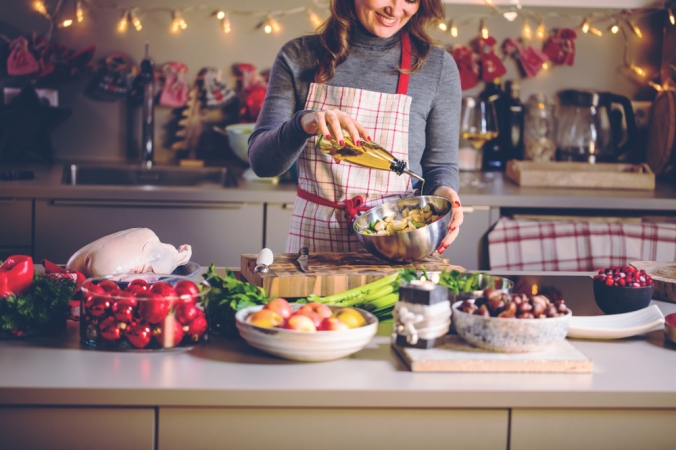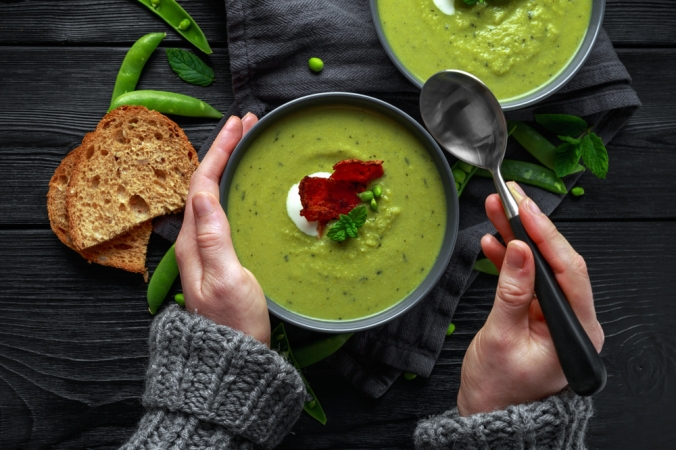We hardly need reminding that there’s just one month to go until the big day! There’s always so much to do, not least when it comes to food planning.
However, it’s not too late to conjure up some healthy snack ideas and side dishes for your Christmas meal.
Clinical nutritionist Suzie Sawyer offers five deliciously healthy suggestions.
Keep your blood pressure low with cauliflower cheese and walnuts
A traditional Christmas meal is probably one of the most stressful anyone will ever have to cook! There’s huge expectation and excitement around it, plus trying to have each dish ready for the same time is not easy.
Cauliflower cheese as a vegetable side is always popular, but why not add a healthy twist with some chopped walnuts scattered over the top. Walnuts are rich in omega-3 fats and have been found to help reduce blood pressure. Plus, cauliflower is a member of the super-healthy brassica family, and is packed with energising B vitamins, fibre and the mineral magnesium. This dish can also be made and cooked ahead – just put under the grill at the last minute to heat through.
Get your circulation flowing with gingered sprouts
No Christmas meal is complete without sprouts! Whether you love ‘em or hate ‘em, there’s no denying they are quintessentially Christmas. Many people have a gene which makes sprouts taste bitter. Therefore, why not mask that flavour by adding some ginger and orange?
Sprouts are hugely healthy, containing plenty of vitamins and minerals. However, they also aid liver detoxification, which might be helpful around Christmas time.
With this vegetable side simply cook the Brussels lightly for about 5 minutes and then toss them in crushed ginger, soy sauce and a little orange juice. Ginger is a wonderfully warming spice which helps blood circulation around the body, delivering nutrients where they’re most needed. None of your guests need to complain about the bitter taste of sprouts again!
Boost your immunity with Santa on a stick
It’s not the usual way we visualise Santa! However, for the younger guests (and slightly older too!) why not offer banana and strawberries in the shape of Santa?
Many people find Christmas pudding far too rich so what better as a healthy and super-easy alternative? Bananas are always popular and are loaded with heart-healthy potassium. Plus, strawberries contain some of the highest amounts of immune-boosting vitamin C of all fruits.
Simply find some long sticks, halve a strawberry for his hat, add three slices of bananas for the body, and add some chocolate drop eyes and buttons as you see fit. It will certainly bring a smile to everyone’s face and provide a healthy dessert option.
Spice up your greens
Kale often gets overlooked when planning the Christmas meal as it can taste quite bland. Plus, if not cooked properly, the leaves are tough to eat. However, why not spice up your kale with some garlic and sesame seeds? Garlic is great for keeping blood pressure in check and sesame seeds are full of bone-loving calcium. Kale, of course is another member of the brassica family and is loaded with anti-aging antioxidants; very helpful during the stressful Christmas period.
Make sure you blanch the kale for about three minutes and then stir fry it with crushed garlic and sesame seeds.
Turbo-charge your day with maca
The herb, maca, is often referred to as natural caffeine. This is because it will certainly provide a boost of energy without the side effects of caffeine. Maca also has many other health benefits including helping to balance hormones, boosting libido and managing the stress response.
You can make a delicious maca shot by using almond or coconut milk (700 ml of either), blended with six dessert spoons of Maca Powder. It will certainly stop your guests from falling asleep after lunch!
So, enjoy creating a range of healthy and delicious sides and snacks this festive season.
FOR MORE GREAT DIET AND LIFESTYLE ADVICE:
Sign up to receive our blog and get a weekly dose of the latest nutrition, health and wellness advice direct to your inbox.
Follow us on Twitter @feelaliveuk for nutrition, lifestyle and well-being tips.
Visit us at www.feelaliveuk.com for the latest offers and exclusive Alive! content.
Follow and Chat with Suzie on Twitter @nutritionsuzie
For everything you need to know about vitamins, minerals and herbs visit our sister site Herbfacts


























